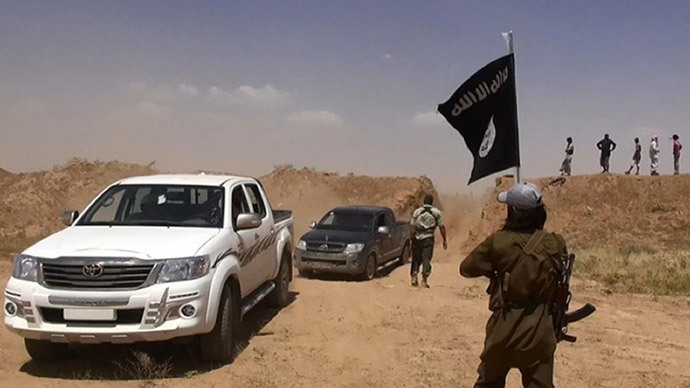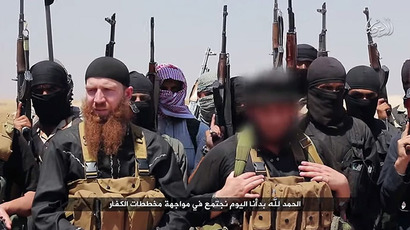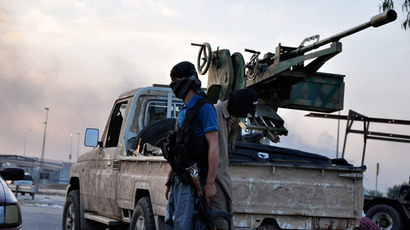US ‘at war’ with ISIS: White House and Pentagon upgrade ‘Al-Qaeda style’ op

The US has, for the first time, declared that it is “at war” with the Islamic State. So far top leaders, Barack Obama and John Kerry among them, have been carefully dodging the term after the not-so-successful campaigns in Iraq and Afghanistan.
White House press secretary John Earnest first used the term “war” on Friday, at least three times. "The United States is at war with ISIL in the same way that we are at war with Al-Qaeda and its Al-Qaeda affiliates all around the globe," he said.
A few minutes later, Pentagon spokesman, Rear Admiral John Kirby, added: “This is not the Iraq war of 2003, but make no mistake, we know we are at war with ISIS, in the same way we are at war and continue to be at war with Al-Qaeda and its affiliates.”
Until Friday, however, neither President Obama, nor Secretary of State John Kerry opted to use that language.
READ MORE: Over 2,700 Iraq air missions preceded Obama’s anti-ISIS campaign expansion
After the president refrained on Wednesday night during a presidential address to call the operation a war, Kerry on Thursday said: “I believe what we’re engaged in is not a full-fledged war like we were in before. It’s a heightened level of counterterrorism campaign, and it will have its own pace, its own dynamic, but it’s counterterrorism.”
“And counterterrorism operations can take a long time, they go on. I think ‘war’ is the wrong reference term with respect to that, but obviously it involves kinetic military action,” Kerry said.
As he toured the Middle East to gather support for the anti-ISIS coalition, Kerry tried to discourage people from what he called “war fever.”
"I think 'war' is the wrong terminology and analogy but the fact is that we are engaged in a very significant global effort to curb terrorist activity," he told reporters.
The wording may not matter much to the outside world. The US has been hitting the ISIS, now known as the Islamic State, with heavy weapons and drones for several weeks, in over 160 operations in Iraq already.
The reason so much emphasis was being given to the language used by the Obama administration is seen to be directly linked to the exit out of Iraq and Afghanistan, amid a global outcry about the earlier invasions and an opinion that ending the conflicts there was long overdue.

The Obama administration’s promise to “end” both conflicts has spanned two of his election campaigns, so it is understandable that another war is not the sort of thing anyone wants to think of, at least in those terms.
"The first thing that's important for people to understand is the president has made clear how the strategy that he is pursuing in Iraq and Syria to degrade and ultimately destroy ISIS is different than the strategy that was pursued in the previous Iraq War," Earnest also said on Friday.
This is not the first time a lack of coherence pervades US’s strategy on Islamic State in the public eye.
While one of the president’s latest announcements on Wednesday promised to “destroy and degrade” the terrorist group, two weeks ago the administration was not at all certain what it was going to do, following the beheading of two American journalists in Syria.
Now, it seems certain that Obama is set on arming “moderate” Syrian rebels to fight the ISIS – which is not too different from what was done at the beginning of the Syrian uprising, right before the Islamic State militants started their rampage across much of the north and the country sank into a drawn-out civil war.
There is also one obstacle to declaring a full-on war in the legal sense – Congressional approval. But in this case this may not be an issue, as Obama is using the post-9/11 Authorization for the Use of Military Force against Al-Qaeda in its place.
Kerry’s Middle East coalition overlooks Iran
Meanwhile, as Kerry gathers backing for the assault on the Islamic State, he is also voicing disagreement with the possibility of Iran joining in. The Secretary of State does not deem it “appropriate” for Tehran to join talks aimed at coming up with a further course of action against the terrorists.
"Under the circumstances, at this moment in time, it would not be right for any number of reasons. It would not be appropriate given the many other issues that are on the table in Syria and elsewhere," he said at a meeting with Turkish leaders in Ankara. He also called Iran “a state sponsor of terror.”
Tehran, for its part, said the coalition Kerry is proposing is “shrouded in serious ambiguities.”
#Egypt on front line of anti-terror campaign, esp in Sinai. Long history of counter-terror cooperation with Egypt + will continue talks @ UN
— John Kerry (@JohnKerry) September 13, 2014
Kerry already said that Saudi Arabia is on board, as well as Qatar, Egypt, Iraq, Jordan, Lebanon and six more Gulf states. It’s not yet certain what role each nation will play, but Ankara doesn’t seem too willing at this point. It has the second-largest NATO force after the United States, but has so far declined to take part in any anti-IS action.
The country has been accused by many of allowing the spread of Islamist extremism at the early stages of the Syrian uprising, by keeping an open border. Some accused it of colluding with the extremists in the sense that the goal of removing President Bashar Assad from power was a common one.
Turkey has flatly denied the allegations.
Ankara’s unwillingness, however, may also come at a price, as the militants draw closer, and have already promised to “liberate” Istanbul at one point.














